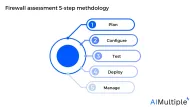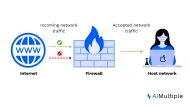SWG or CASB in 2024: Which One Is Right for Your Business?
94% of enterprises use some form of cloud computing service. The high level of cloud usage raises concerns about the security of sensitive business information and intellectual property due to cyber threats. There are several cloud security solutions on the market that can cause confusion among business leaders and users.
Secure web gateway (SWG) and cloud access security broker (CASB) are two such security solutions that provide data and threat protection as cloud-based proxies. Since SWGs and CASBs are similar, it is easy to confuse one with the other. This article demonstrates the main differences between SWG and CASB and discusses which cybersecurity solution is suitable for your business.
What is SWG?
A secure web gateway‘s primary function is safeguarding users and their data. When data is stored virtually in the cloud, it is vulnerable to tampering. SWG prevents unauthorized access to a company’s network by filtering out unwanted intruders and controlling internet traffic.
An SWG typically contains the following elements:
- URL filtering
- Malicious code detection and filtering
- Application controls for popular web-based apps.
SWG is available as hardware, software, or a cloud-based solution.
What is CASB?
Cloud Access Security Brokers (CASB) are cloud-based cybersecurity solutions that act as intermediaries between cloud systems and users. They help address security flaws while ensuring compliance with company policies in the cloud by:
- Having a multi-layered protection scheme that stops suspicious actions and recognizes compromised devices.
- Limiting connection to hazardous apps and unsafe websites.
- Protecting remote workers from external risks and dangers and increasing their productivity.
Cloud access security brokers vs. secure web gateways
Both CASB and SWG are:
- Proxies,
- Cloud-based solutions. Most but not all SWGs are cloud-based,
- Safeguarding data,
- Replacing firewalls.
However:
- SWGs focus on protecting corporate users and their data, including on their various devices,
- CASBs safeguard your cloud applications and protect them from unauthorized access.
Many companies are concerned with corporate user device security. SWG is an excellent solution for managed and organizational network devices since URL filtering helps identify dangerous websites and prevent access.
However, when employees use their personal devices to access enterprise applications, SWG would have no authority. CASB controls the data traffic of corporate applications on any device, including personal ones. A CASB can differentiate between all kinds of devices and then implement diverged data guidelines based on each device type.
For instance, if a worker uses their personal laptop/phone to access a network, the company will still have control of that data after it is downloaded if a CASB is implemented.
If you can’t decide which cybersecurity solution to adopt, you can use a combination of CASBs and SWGs, since both solutions are necessary to provide comprehensive security coverage.
Further reading
- Software Defined Perimeter: Definition, Importance & Use Cases
- Zero Trust Network Access (ZTNA): Benefits & Deployment
- Secure Access Service Edge: The New Norm for Cybersecurity
- 5 Cybersecurity Trends Organizations Must be Aware
Please contact us if you require any additional information about cybersecurity solutions:

Cem has been the principal analyst at AIMultiple since 2017. AIMultiple informs hundreds of thousands of businesses (as per similarWeb) including 60% of Fortune 500 every month.
Cem's work has been cited by leading global publications including Business Insider, Forbes, Washington Post, global firms like Deloitte, HPE, NGOs like World Economic Forum and supranational organizations like European Commission. You can see more reputable companies and media that referenced AIMultiple.
Throughout his career, Cem served as a tech consultant, tech buyer and tech entrepreneur. He advised businesses on their enterprise software, automation, cloud, AI / ML and other technology related decisions at McKinsey & Company and Altman Solon for more than a decade. He also published a McKinsey report on digitalization.
He led technology strategy and procurement of a telco while reporting to the CEO. He has also led commercial growth of deep tech company Hypatos that reached a 7 digit annual recurring revenue and a 9 digit valuation from 0 within 2 years. Cem's work in Hypatos was covered by leading technology publications like TechCrunch and Business Insider.
Cem regularly speaks at international technology conferences. He graduated from Bogazici University as a computer engineer and holds an MBA from Columbia Business School.
To stay up-to-date on B2B tech & accelerate your enterprise:
Follow on

Comments
Your email address will not be published. All fields are required.